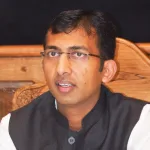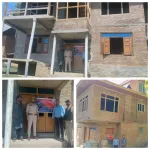The 75th year of India as a republic coincides with 50th year of establishment of Krishi Vigyan Kendras’ (KVKs); institutes that all through these five decades have proved their indispensability in the transformation of agriculture sector in the country. As a part of the front line extension system of the Indian Council of Agricultural Research (ICAR), their contribution towards bringing about socio-economic upliftment of the farming community in which a majority of the farmers are small, marginalized and resource poor is immense.
After independence, it started in 1960s. Like other sectors, the agricultural sector in the country was also witnessing some institutional reforms as well as structural changes. As agriculture was the backbone of the economy, revival and strengthening of the farm sector needed to be prioritized. The second education commission 1964-66 under the chairmanship of Dr. D. S. Kothari recommended for the establishment of agricultural polytechnics to provide vocational education in agriculture to school drop outs and other rural youths. After threadbare deliberations by the representatives of Ministry of Education, Ministry of Agriculture and the Planning Commission (NITI Aayog); the Indian Council of Agricultural Research (ICAR) as a follow up to the recommendations emerging out of the deliberations constituted a committee in 1973 under the chairmanship of Captain Mohan Singh Mehta of Udaipur to work out a comprehensive plan for establishment of such institutes.
Captain Mohan Singh Mehta thus came up with the institutional design in the form of Krishi Vigyan Kendra (KVK) and the first KVK was established in the year 1974 in Pondicherry (now Puducherry) under the administrative control of Tamilnadu Agricultural University (TNAU) Madras in Tamilnadu. Since the establishment of first KVK in 1974, these district level institutes are at the forefront of technology dissemination and a vital and integral part of the National Agricultural Research System (NARS) of the country. Their role and contribution in the agricultural sector of the country has been immense.
At the district level, it caters to the diverse needs of farming communities working in different agro-climatic zones and different farming situations. Presently, each KVK has a team of six scientists of different disciplines with each one taking care of the subject matter of his/her area. Although, the initial idea of setting up of these KVKs was to provide vocational training to rural youths in agriculture and other allied sectors; but with the passage of time the roles and responsibilities of these KVKs changed. Today KVKs provide a platform for interface between farmers, researchers and extension functionaries to address the problems of agriculture and allied sectors. These institutions are engaged in on farm testing to assess the location specific needs of the farm sector, front line demonstrations to establish production potential of technologies on farmers’ fields; to conduct training programmes for farmer, youths, farm women for their skill development, to act as a resource and knowledge centre of agricultural technologies for supporting initiatives of public and private sector for improving the agricultural economy of the country and the state in particular in which they are located and to provide agro advisories to the farming community using Information and Communication Technologies (ICTs) and other tools.
With the passage of time KVKs mandate has changed from a single commodity approach to a broad based that now includes not only cereal crops but to other crops like horticultural, medicinal, oilseed, pulses and all other crops that are grown within the concerned district. Besides, KVKs are now training young person to become entrepreneurs, providing farm and weather advisory services, celebration of important days, and in devising technologies that help in drudgery reduction. There is also a lot of reporting work in the KVKs. So a meagre strength of six, finds itself overloaded and difficult to cope with the increasing responsibilities. Also a single KVK in districts having population in crores is not sufficient to cater to the needs of all.
A statement of the Press Information Bureau (PIB) reveals that there are 731 Krishi Vigyan Kendras’ in the country of which 38 are under the control of state governments, 66 under ICAR institutes, 103 under NGOs, 506 under State Agricultural Universities, 3 under Central universities, 3 under Public Sector Undertakings, 7 under deemed to be universities and 5 under other Educational institutes. Uttarpradesh leads the states in having the maximum 89 KVKs. All the KVKs are now under 11 different Agricultural Technology Application Research Institutes (ATARI) previously called as Zonal Project Directorates (ZPDs).
ATARI Zone 1 at Ludhiana has 72 KVKs including UTs of Jammu Kashmir and Ladakh, Himachal Pradesh and Uttarakhand and Punjab. ATARI zone II at Jodhpur has 66 KVKs of Delhi, Haryana and Rajasthan; ATARI zone III Kanpur has 89 KVKs of Uttar Pradesh alone, ATARI zone 1V Patna has 68 KVKs of Bihar and Jharkhand, ATARI zone V Kolkata has 59 KVKs of Odisha, West Bengal and Andaman and Nicobar Islands, ATARI zone V1 Guwahati has 47 KVKs of Assam, Arunachal Pradesh and Sikkim, ATARI zone V11 Barapani HAS 43 KVKs of Manipur, Meghalaya, Mizoram, Nagaland and Tripura, ATARI zone V111 Pune has 82 KVKs of Maharashtra, Gujarat and Goa, ATARI zone 1X Jabalpur has 82 KVKs of Chattisgarh and Madhya Pradesh, ATARI zone X Hyderabad has 72 KVKs of Tamilnadu, Pondicherry, Andhra Pradesh and Telangana and ATARI zone X1 Bangaluru has 48 KVKs of Karnataka, Kerala and Lakshadweep.
A high powered committee on management of KVKs was set up under chairman ship of Dr. R. S. Paroda. It came up with a slew of recommendations regarding the Krishi Vigyan Kendra. It recommended the change of vision of KVKs to ‘Science and technology-led growth leading to enhanced productivity, profitability and sustainability of agriculture’, where as the Mission should be ‘Farmer-centric growth in agriculture and allied sectors through the application of appropriate technologies in specific agro-eco system perspective’. The new mandate of the KVKs as recommended by Paroda Committee was ‘Technology Assessment and Demonstration for its wider Application and Capacity Development’ (TADACD). It also called for an additional Krishi Vigyan Kendra in the district be established only based on specific criteria such as large rural population, bigger geographical area, higher net sown area, relative Executive Summary backwardness norms of the district, more Tribal/Scheduled Caste/Scheduled Tribe population, and those in mountainous (above 5000 feet above mean sea level) and difficult/border areas.
A third party evaluation of KVKs carried out by National Institute of Labour Economics Research and Development (NILERD), an autonomous institute under NITI Aayog in 2018 came out with findings which reveal that the KVKs all across the country are doing a tremendous job accomplishing and achieving many milestones. The evaluation found that KVKs are playing a proactive role in transferring new technology at field level with beneficial impacts and that these institutes have an edge over other service providers by virtue of having better technical expertise and demonstration abilities. The technologies demonstrated by KVKs were immediately adopted by 40 percent of the farmers and 25 percent adopted them by the next agricultural season. On an average a KVK covers 43 villages and 4300 farmers every year and 80% of villages covered are 10 kilometers away from KVK. The evaluation further said that 96 percent of the farming queries were attended by the KVKs and 42% technologies adopted by farmers resulted in higher productivity and 20 percent resulted in drudgery reduction. About 25% of the persons trained by KVKs started their own self employment ventures.
Since their establishment KVKs have been proactively contributing to the development of farms and farming community by way of disseminating of sustainable technologies, their awareness and sensitization, skill development of youths and farmers including farm women, developing adequate linkages with private and public institutes, collaborations with all relevant stakeholders, providing marketing support, mobilization of this largely static entity and much more. The OFTs and FLDs laid out by KVKs in lakhs in the farmer fields have resulted in a huge increase in the production and productivity of the farms ultimately benefitting the farming community. Most of the flagship programmes of the government are now reach out to potential beneficiaries through these district level institutes.
(The author writes on agriculture and social issues, can be reached at: [email protected])





